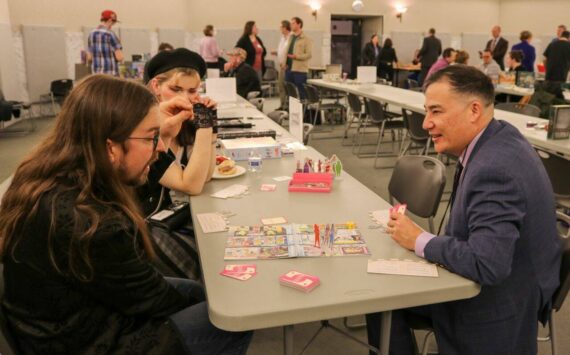ON THE NOV. 5 BALLOT
VOTERS WILL BE ASKED
TO DECIDE THIS:
Initiative No. 1 removes those provisions of the Tacoma Municipal Code which prohibits discrimination in employment, housing, public accommodation and lending based on sexual orientation or gender identity. A yes vote enacts the Initiative. A no vote defeats the Initiative. Should this initiative become law?
A debate yesterday over Tacomas recently passed anti-discrimination ordinance for sexual minorities became a question of special rights versus equal rights, as proponents and opponents of repealing the ordinance squared off.
Members of Help Us Take Back Tacoma – Again! (HUTBTA), the group in favor of removing the law from the books, took on members of Tacoma United for Fairness (TUFF), which opposes getting rid of the ordinance.
A crowd of 105 members and guests of City Club of Tacoma, which hosted the debate, turned out at the Sheraton to hear both sides discuss Initiative No. 1 on the Nov. 5 ballot.
The passage of Initiative No. 1 would reverse the City Councils April 23 passage of an anti-discrimination ordinance for sexual minorities.
Specifically, the ordinance adds sexual orientation and gender identity to the city law that prohibits discrimination based on race, age, gender, disability, religion, marital or familial status or national origin.
Pierce County Superior Court Judge Kitty-Ann van Doornick moderated the 30-minute structured debate that included written questions from the audience.
It gives special rights, not equal rights, said Curt Anderson, president of Air Control Systems, of the ordinance, adding it offers a solution to a problem that doesnt exist.
He said the ordinance would have unintended consequences, arguing that sexual minorities were not disadvantaged and so dont need protection written into the law.
On average, Anderson claimed homosexuals earn more money than heterosexuals and have political power.
People with objections to homosexuality based on religious beliefs could be discriminated against because of the ordinance, he said.
Also representing the pro-repeal side were HUBTA co-founder Hap Butler and Doug Delin, fellow HUBTA co-founder, as well as founder of McKinley Hill Boosters and a past candidate for City Council.
This issue is about discrimination, pure and simple, said Laurie Jinkins, TUFF campaign co-chair and attorney with the Washington State Department of Health. It doesnt support or condone any type of behavior.
Andreta Armstrong, representing The Black Collective, a group of local black community leaders, and John Lantz, president of Lucks Food Decorating Company, joined Jinkins on the anti-repeal side.
Lantz said discrimination against homosexuals was a real problem and that he knew of a gay man who was dismissed from a job interview when the interviewer found out about the applicants sexual orientation.
This ordinance prohibits this type of discrimination, he said.
Armstrong said the religious community doesnt have to condone homosexuality, but can also support anti-discrimination.
Our religion is not an issue, she said.
A good portion of the debate focused on the ordinances effect on business in Tacoma.
Delin said the ordinance passed in April provides for unlimited punitive damages that could be awarded to someone making a claim of discrimination based on sexual orientation.
There is no private right to sue, Jinkins countered, adding there have been no massive fines and that the vast majority of cases are settled by mediation.
Character is important, Anderson said, referring to what he looks for in hiring someone. We dont discriminate, but we look for standards.
Lantz responded by saying if the ordinance was eliminated, those legitimately discriminated against based solely on their sexual orientation would have no recourse.
Tacoma is the last major city on the West Coast to enact an ordinance to protect sexual minorities, Lantz said, and repealing the law would create a negative business climate.
Debaters also clashed over the question of choice in terms of sexual identity and how that relates to the law.
Butler said it was wrong for the city to offer legal protection based on a behavior someone chooses.
Jinkins pointed out that religion and marital status are chosen behaviors that are protected under the law.
Despite the occasional claims of question dodging and the sometimes heated exchange, participants were civil to one another.
After the debate ended, a man from the audience, Ken Maaz, confronted Delin, claiming he had been fired from a job in Texas simply for being gay.
Both men argued with one another for several minutes about the merits of Initiative No. 1 as people filed out of the room.
Yesterdays debate will be televised locally on TV Tacoma, cable channel 12 on Click! Network and AT&T Broadband in Tacoma, and cable channel 21 on AT&T Broadband in Fircrest, University Place, Lakewood, Puyallup, Sumner, Fife, Milton and Edgewood.
Dates and times are as follows:
– Monday, Oct. 21, 8 p.m.
– Tuesday, Oct. 22, noon
– Wednesday, Oct. 23, 9 a.m.
– Thursday, Oct. 24, 9 p.m.
– Friday, Oct.25, 4 a.m. and 2 p.m.
– Saturday, Oct. 26, 5 p.m.
– Sunday, Oct. 27, 1 a.m. and 3 p.m.
– Monday, Oct. 28, 8 p.m.
– Tuesday, Oct. 29, 4 a.m. and 11 p.m.
– Wednesday, Oct. 30, 9 a.m.
– Thursday, Oct. 31, 9 p.m.




